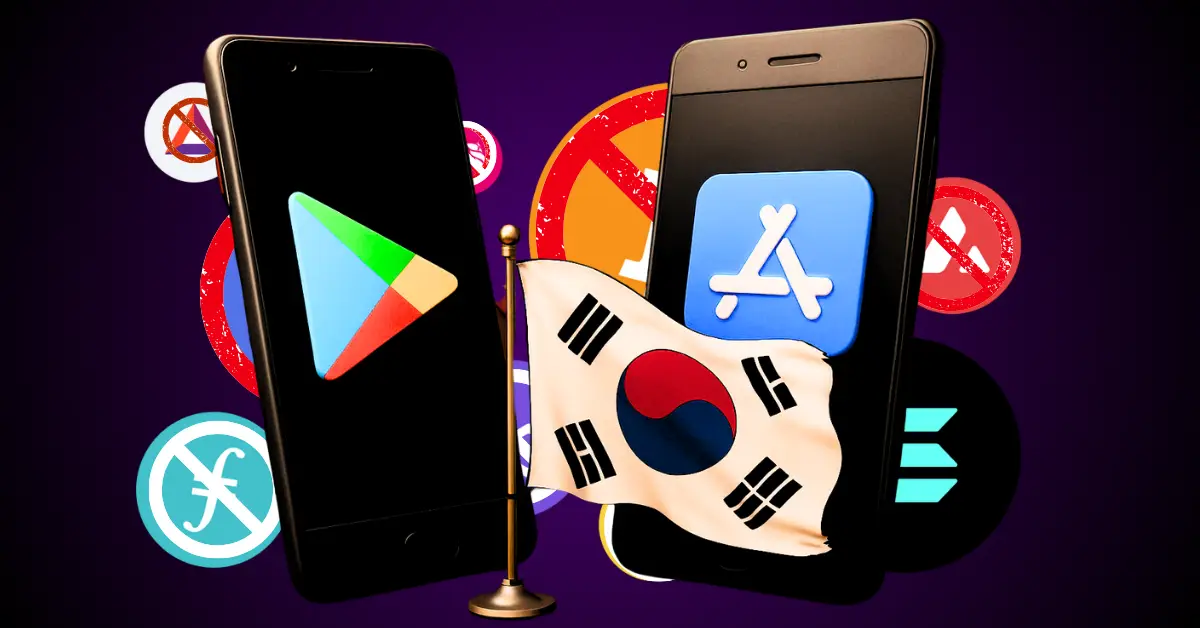
South Korea is making big moves to clamp down on illegal crypto activity, and it’s sending a clear message to the global crypto community. Just this week, regulators asked Apple to block 14 crypto apps from the local App Store, as part of their ongoing efforts to protect users from unregulated platforms.
But that’s not all—major crypto exchanges, including KuCoin and MEXC, are now in the spotlight.
Keep reading to know more.
South Korean authorities are targeting well-known exchanges like KuCoin and MEXC, which have already been blocked from accessing domestic services since April 11. These moves are part of a wider crackdown on foreign crypto platforms that have not properly registered with South Korean regulators.
Foreign crypto businesses wishing to operate in South Korea must report to the Financial Intelligence Unit (FIU) under the Act on Reporting and Use of Specific Financial Transaction Information. This ensures that foreign platforms comply with local laws before engaging in business activities.
Serious Consequences for Non-Compliance
Crypto companies that offer Korean-language websites, accept payments in the won, or market to South Korean users must register with the FIU. If they don’t, they risk facing up to five years in prison or a fine of 50 million won (about $36,000).
The FIU has already taken action against several unregistered platforms. In 2022, 16 companies were blocked, followed by six more in 2023. These platforms had their access to South Korean websites and apps shut down.
The FIU plans to continue blocking non-compliant platforms, including their websites and mobile apps, to reduce the risk of money laundering and better protect users.
The push to remove unregistered platforms extends beyond South Korea. On March 26, Google Play blocked several crypto apps, including KuCoin and MEXC. The Financial Services Commission (FSC) also released a list of 22 unregistered platforms, with 17 already blocked from Google’s app store.
These actions are part of South Korea’s broader strategy to regulate the cryptocurrency market, ensure transparency, and prevent illegal activity. Last month, the government also asked Google to block 17 more crypto apps and hinted at plans to block exchange websites that fail to comply. Exchanges like KuCoin, CoinW, Bitunix, and KCEX were singled out for running Korean-language websites and marketing to South Korean users without proper registration.
Crypto task force in the making
South Korea is also planning to make its crypto task force a permanent unit. This follows several scandals, including a public official using disaster relief funds to trade crypto and a fake mining site in Gwangju that was actually operating as an illegal gambling platform.
The risks of using unregistered platforms
The FSC has warned users about the dangers of engaging with unregistered platforms. Currently, only 28 crypto companies are officially registered in South Korea, making it even more important for users to stick with platforms that follow the law.
With stricter rules in place, South Korea is making it clear that the crypto world needs to play by the rules—no exceptions.
South Korea has asked Apple to block 14 crypto exchange apps from its App Store and has blocked domestic access to apps like KuCoin and MEXC since April 11.
Failure to comply can lead to severe penalties, including up to five years in prison or a fine of around 50 million won (about $36,000).
XRP is making headlines again as whispers of a potential ETF approval ripple through Wall…
While most presales slow down before hitting momentum, Mutuum Finance (MUTM) is doing the opposite—accelerating.…
The XLM price has made a strong comeback in July, as the crypto registered a…
Ripple’s native token, XRP, has just climbed to the third spot in the global crypto…
Binance co-founder and former CEO Changpeng “CZ” Zhao is threatening legal action against Bloomberg over…
On Friday, the top Democrat on the House Financial Committee, Congresswoman Maxine Waters, declared that…